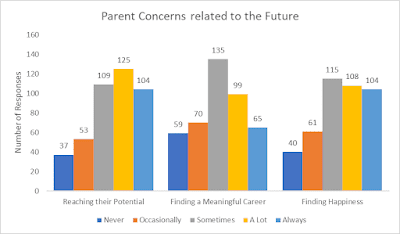Many parents of gifted children describe their child's intensity as a core feature of their personality. They might be amazed by their child's ability to explore areas of interest with such depth and passion, as well as their perceptiveness and empathy. However, they also might bemoan their child's intensity, and endure a wild emotional ride, powerfully angry outbursts, and meltdowns. When a child's emotions lack modulation, they may get stuck in a loop of obsessive thinking, perfectionism, or sadness - and both parents and their child can feel overwhelmed.

Sometimes associated with Dabrowski's five overexcitabilities, intensity infuses a level of energy that amplifies most reactions. These are the young kids who devour chapter books, who can recite the name of every dinosaur, and who practice clarinet for hours. They react to situations with powerful emotions, whether distressed, excited, angry, or exhausted. Their extraordinary focus, compassion for others, and heightened sensitivity are sights to behold. They sob with empathy when their friend's dog dies, scream with frustration when unable to solve a puzzle, and grapple with existential despair when the world just seems unfair.
In an online survey of parents of gifted children (see below for more information about the survey),* 80.8% of parents indicated that their child exhibited heightened intensity. Furthermore, 72.7% indicated that their child was highly sensitive. While survey responses were based on a parent's subjective assessment, these responses nevertheless corroborate the research, theory, and commentary regarding the family's felt experience. Parents frequently view their gifted children as intense and sensitive - and their intensity has an impact on family life. Several comments from the survey aptly describe this:
“I often wonder what dinnertime conversations are
like in other households. In ours, they can bounce from some new science theory
someone read about to reminding our teenagers to use silverware (still!) to
etymology to glares from one kid because their sibling is chewing noisily to
discussions on which religion is best to one kid teaching the other how to
swear in Latin. It’s exhilarating but exhausting!”
"Living with the intensity is for me the hardest part to balance. It feels like from the moment they wake up until the moment they go to sleep, we join them on a roller coaster that keeps going. No stops. However, there is also so much joy in seeing all the creative ways they try to problem-solve. It is an exhausting, yet very joyful journey at the same time."
When intense, gifted children venture out into the world, they often receive messages from adults in authority (e.g., teachers, camp counselors, sports coaches) to tone down their reactions, sit still and "shake it off." Their exuberance and curiosity for learning are seen as an interference and impediment. They may feel ashamed of their intensity and think that there is something wrong with them. As a result, they need your loving acceptance to offset these experiences - to provide perspective and an antidote to the negative messages they receive elsewhere. Your concerns are valid; nevertheless, appreciating the positive aspects of their intensity will allow you to accept (rather than fight against) this trait.
So how do we help our children turn down the volume on that intensity radio dial?
1. First, ground yourself in your values and goals as a parent. Typically, stress and frustration arise when our children behave in a manner that is unpleasant, oppositional, frustrating, or embarrassing. Remaining consistent with your values (e.g., providing love, acceptance, support, and appropriate limits) can help you regain perspective when faced with overwhelming reactions. Your child's intensity may contribute to conflicts and stress within the family; yet, trying to cajole, bribe, or even demand that they approach situations less intensely never works. Appreciate that they are experiencing powerful, raw emotions, or a compelling sense of creative flow. They are not trying to be difficult - they are just doing what comes naturally. Nevertheless, they will benefit from your guidance in learning how to manage these powerful feelings.
2. Focus on appreciation and gratitude for who they are. Sounds easy, but it can be difficult to cultivate loving acceptance in the midst of a chaotic meltdown! While intensity can be challenging and exhausting, though, it also infuses family interactions with energy and joy. Intense, gifted children can open your eyes to the beauty around you, reawaken long-suppressed drives of your own, and remind you of what is important. These are kids who love deeply, possess abundant curiosity, and who can (will) bring their passion and creative drive to a future career. As idealistic as it sounds, they have great potential to do good in this world.
3. Rethink your own relationship to intensity. As the parent of a gifted child, it is likely that you, too, are gifted, and well acquainted with intensity on a deep and personal level. The apple doesn't fall far from the tree. You may recall situations as a child when your intensity was embraced and nurtured, or conversely, shamed and criticized. Consider how you view your own intensity and emotional reactivity - and use that awareness to enhance empathy for your child and fine-tune your approach to parenting.
4. Like any developing talent, skill, or expression of raw temperament, intensity needs to be nurtured and at times, managed. Your child feels overwhelmed by their emotions and needs your guidance to learn how to direct their focus, how to pace themselves, and how to calm their emotions when this leads to meltdowns or despair. You can remind your child that, yes, they experience powerful emotions, but they also will benefit from learning to harness that energy, apply it when needed, and redirect it when it seems out of control. You can intervene with suggestions, guidance, and preventative strategies that may offset potential problems (more about this in future articles). For example, if your child is late for school because of immersion in an art project, consider how to intervene earlier to help them transition. If your child is despondent about social injustice, encourage them to invest their energy in volunteer work, Strategies for resilience-building also may be helpful. A variety of parenting strategies can be found in many of the excellent books listed below.***
When intensity is viewed as a true "gift" rather than a flaw, your child will accept this trait without shame or self-doubt. This will help them harness their energy effectively, and diffuse the overwhelming feelings they experience. And when your child is more relaxed, your life will be a little easier as well.
*The Gifted Parenting Survey was initiated to obtain the parent's perspective on child-raising, along with personal reactions to parenting a gifted child. Survey questions were distributed online through my website, this blog site, and through social media and gifted parenting forums. The survey remained active online for six weeks in early 2022, and 428 parents responded. Additional findings will be shared in future blog posts and articles, but a full summary can be found in my upcoming book through Gifted Unlimited Press, "The Gifted Parenting Journey: A Guide to Self-discovery and Support for Families of Gifted Children."
**All names or identifying information were changed to protect confidentiality.
***In addition to the information about intensity and parenting guidance that can be found in my upcoming book, the following are a few of the many excellent books available that may offer guidance when needed:
Daniels, S., & Piechowski, M. M. (Eds.). (2009). Living
with intensity: Understanding the sensitivity, excitability, and emotional
development of gifted children, adolescents, and adults. Great Potential
Press.
Kurcinka,
M.S. (2006). Raising
your spirited child: A guide for parents whose child is more intense, sensitive,
perceptive, persistent, and energetic. William Morrow.
Nelson, J. (2006). Positive discipline:
The classic guide to helping children develop self-discipline, responsibility, cooperation,
and problem-solving skills. Ballantine Books.
Prober, P. (2016). Your rainforest mind: A guide to the
well-being of gifted adults and youth. GHF Press.
Silverman,
L. K. (2013). Giftedness 101. Springer.
Webb,
J. T., Gore, J. L., Amend, E. R., DeVries, A. R., & Kim, M. (2008). A
parent’s guide to gifted children. Gifted and Talented International, 23,
155-158.






.jpg)



